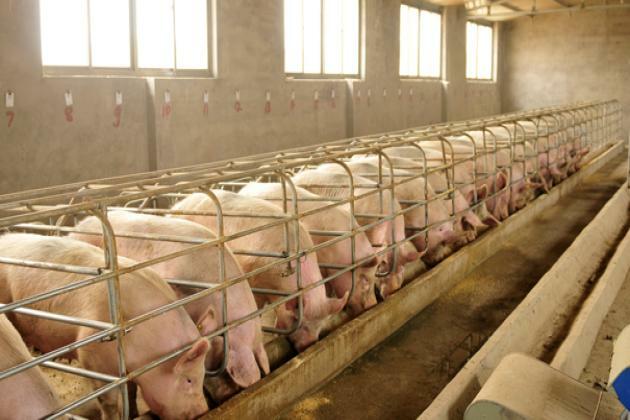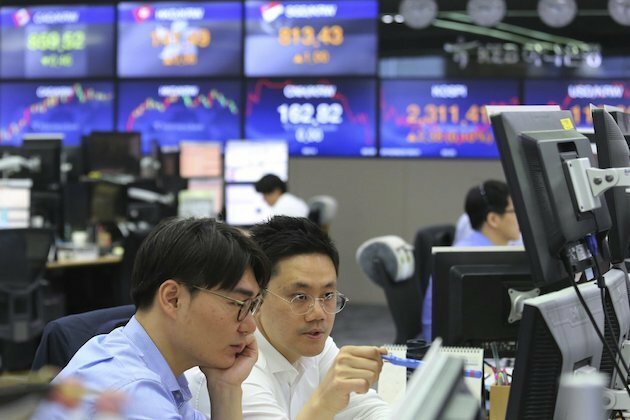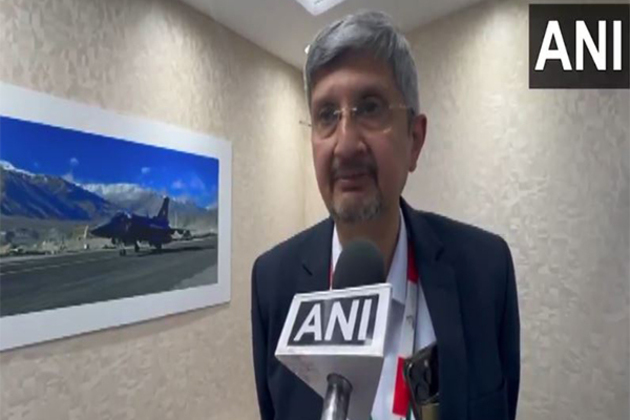US Farmers Hope for US-China Trade Deal as Pork, Soybean Tariffs Ease
Voice of America
17 Sep 2019, 07:12 GMT+10

- Thomas Titus handles all the challenges of running his sprawling Elkhart, Illinois, farm, but lately, he isn't making a lot of money doing it.
- "We're producing corn and we're producing soybeans at below cost of production almost, and we're raising pigs at below cost of production," he told VOA, his voice competing with the sou ...
- It's not unusual for farmers to diversify their products but Titus says his pork operation isn't typical.
ELKHART, IND. - Thomas Titus handles all the challenges of running his sprawling Elkhart, Illinois, farm, but lately, he isn't making a lot of money doing it.
"We're producing corn and we're producing soybeans at below cost of production almost, and we're raising pigs at below cost of production," he told VOA, his voice competing with the sounds of hundreds of hogs housed in one of several nearby buildings. "We're in a challenging time whenever we get to the end of the year and we need to shore up some of those books."
It's not unusual for farmers to diversify their products but Titus says his pork operation isn't typical.
"We're somewhat of a rarity given our size. We're a 600-sow farrow-to-finish farm, so we raise pigs from birth up to market weight, so our size and what we do is a little more dynamic and diverse," he said.
Dependent on trade
In total, Titus raises about 12,000 pigs a year, many sent to the international market. He said much of his profit comes from such exports.
"One in every four pigs we raise goes to a foreign country of some kind, so we are extremely dependent on those positive trade negotiations and trade agreements for the success of our business."
One key buyer of U.S. pork is China, the world's largest importer, which is dealing with a major outbreak of Asian swine fever. As a result, China's pig population has decreased about 20%. Some estimates indicate China has culled more than 1 million pigs.
When it was needed most, American pork was more expensive than other sources because of steep tariffs imposed by the Chinese government, one of many Beijing imposed on American agricultural products amid a protracted trade war with Washington.
Now, China has announced a tariff exemption on U.S.-produced pork, relaxing a punishing 72% duty.
Trade war damage done
But economic damage has been done to the U.S. pork industry.
"We've lost about $1 billion worth of pork sales, or what Iowa State University has put out a study, $8 per hog is what it's cost us on the tariffs," said Karl Setzer, a commodity risk analyst with AgriVisor, who added that even before tariffs, China tended to spread out its purchases.
"China doesn't like to marry themselves to one commodity supplier, be it pork, beef, soybeans, whatever it is," he said.
So when American pork couldn't compete on price because of tariffs, Setzer said China turned more to other suppliers, like the European Union and Brazil.
"Brazil has seen their trade jump 5% in the last year. The trade war isn't helping us at all. We would likely have a bigger share because we are a bigger pork producer, but it comes down to value and what we are willing to sell our pork for," Setzer said. "They're (China) still showing interest in our offerings, but when you look at all the other factors, the trade war on a whole is probably one of the worst ones we've been in."
It's unclear how much China will increase purchases now that certain tariffs, including those on pork and soybeans, are removed.
Supporting Trump, not tweets
And even though, as with other farmers, Titus has taken direct hits for the price of almost everything he is producing on his farm as the trade war continues, he said he still supports President Donald Trump, but would like to see fewer trade negotiations happen via presidential tweet.
"It takes three tweets and this market takes a crash," he said.
Which is why Titus hopes upcoming face-to-face negotiations between the United States and China produce tangible, long-term results, creating some stability for commodity markets, and ultimately his bottom line.
Source: VOA
 Share
Share
 Tweet
Tweet
 Share
Share
 Flip
Flip
 Email
Email
Watch latest videos
Subscribe and Follow
Get a daily dose of Cleveland Star news through our daily email, its complimentary and keeps you fully up to date with world and business news as well.
News RELEASES
Publish news of your business, community or sports group, personnel appointments, major event and more by submitting a news release to Cleveland Star.
More InformationBusiness
SectionWall Street has relapse Wednesday, after Tuesday's heady gains
NEW YORK, New York - U.S. stocks were weaker Wednesday, following Tuesday's heady gains when the Dow Jones jumped 741 points. Bond...
China’s GAC launches in Brazil as EV demand accelerates
SAO PAULO, Brazil: Amid a surge in electric vehicle (EV) adoption and growing competition in Brazil, Chinese automaker GAC has officially...
McDonald’s to shut down CosMc’s drink spinoff after short run
CHICAGO, Illinois: McDonald's is closing its experimental beverage spinoff, CosMc's, less than two years after launching the standalone...
China’s Lenovo profit plunges 64%, misses estimates sharply
BEIJING, China: China's Lenovo reported a steep 64 percent drop in fourth-quarter profit, falling significantly short of analyst expectations...
Economic data gives welcome relief to Wall Street
NEW YORK, New York - Strong economic data jump-started U.S. stocks and the dollar Tuesday, a welcome reprieve after weeks of pressure...
PepsiCo cleared in FTC case over Walmart discounts
NEW YORK CITY, New York: This week, the U.S. Federal Trade Commission (FTC) dropped its lawsuit against PepsiCo, which had accused...
Ohio
SectionVolvo CEO: Customers could bear cost of rising US tariffs
STOCKHOLM/DETROIT: Volvo Cars customers will likely bear the brunt of increasing trade tariffs, CEO Hakan Samuelsson said this week,...
Biden-era fuel rules face pushback over EV inclusion
WASHINGTON, D.C.: The U.S. Transportation Department is expected to say that fuel economy rules created under President Joe Biden went...
Centre grants second one-year service extension to DRDO chief Dr Samir V Kamat
New Delhi [India], May 26 (ANI): In a significant decision, the centre has granted Dr Samir V Kamat, the Defence Research and Development...
Oracle, Cleveland Clinic, G42 announce strategic partnership to launch AI-based global healthcare delivery platform
ABU DHABI,16th May, 2025 (WAM) - Oracle Health, Cleveland Clinic, and G42 today announced a strategic partnership to develop a groundbreaking...
PureHealth, SEHA partner with Cincinnati Children's to advance paediatric care ecosystem
ABU DHABI, 6th May, 2025 (WAM) -- PureHealth and its subsidiary SEHA have partnered with the number one US children's hospital, Cincinnati...
Cleveland Clinic Abu Dhabi performs transcontinental robotic-assisted focal therapy for prostate cancer
ABU DHABI, 16th April, 2025 (WAM) -- Cleveland Clinic Abu Dhabi, part of the M42 group, has achieved a historic milestone in global...













